2022-2023学年人教版八年级上册英语Unit1 SectionA 3a-3c课件- (共22张PPT无音视频)
文档属性
| 名称 | 2022-2023学年人教版八年级上册英语Unit1 SectionA 3a-3c课件- (共22张PPT无音视频) | 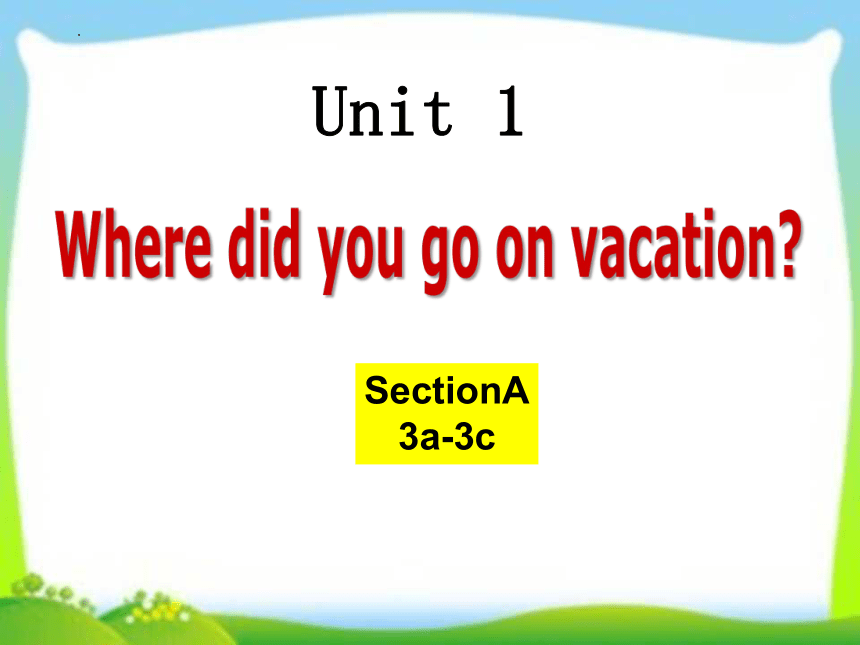 | |
| 格式 | zip | ||
| 文件大小 | 1.7MB | ||
| 资源类型 | 教案 | ||
| 版本资源 | 人教新目标(Go for it)版 | ||
| 科目 | 英语 | ||
| 更新时间 | 2022-09-12 22:49:03 | ||
图片预览

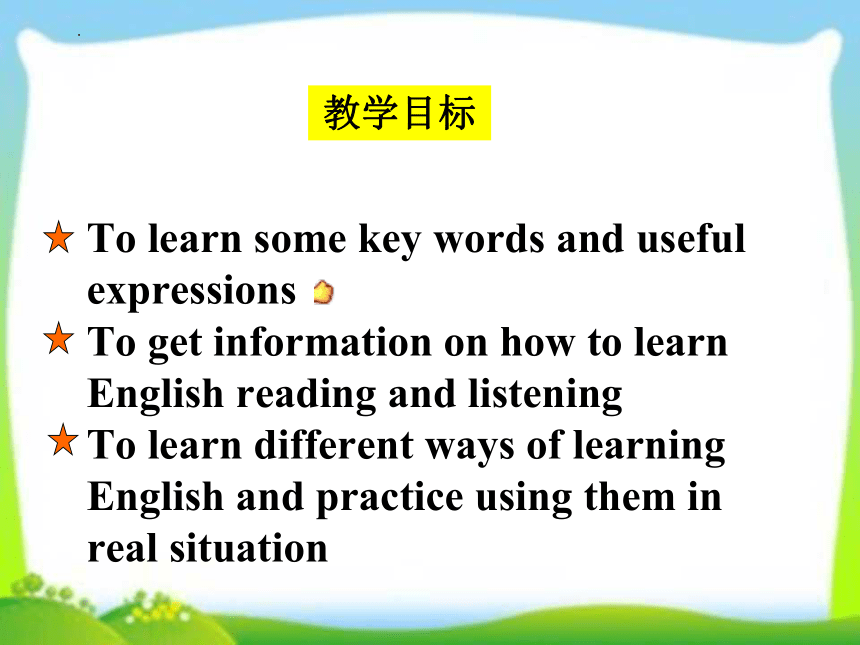
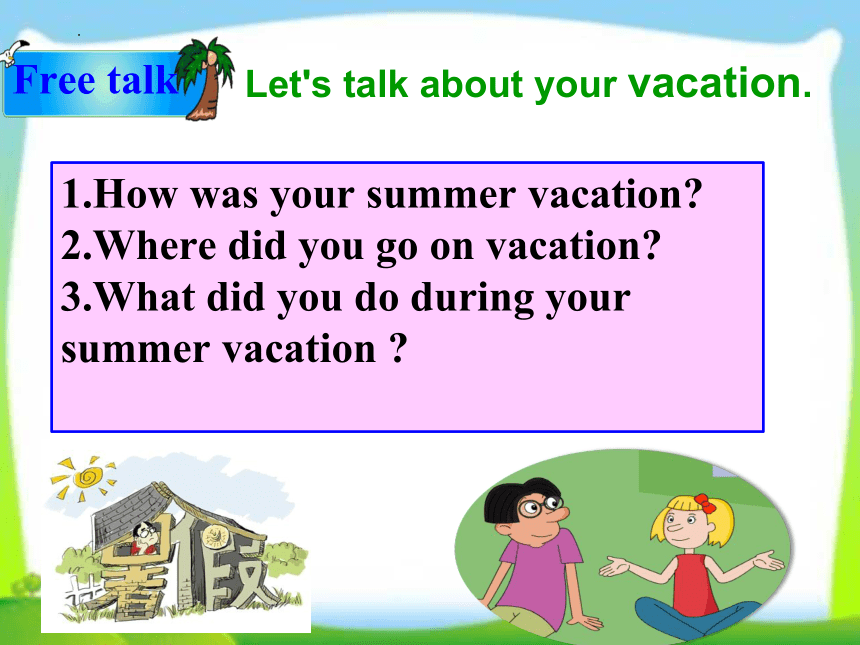
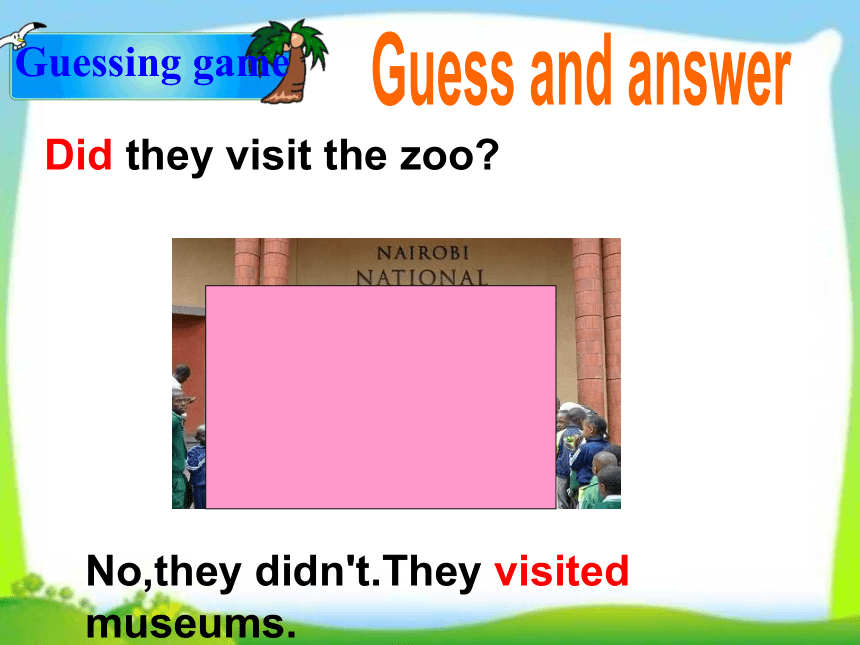
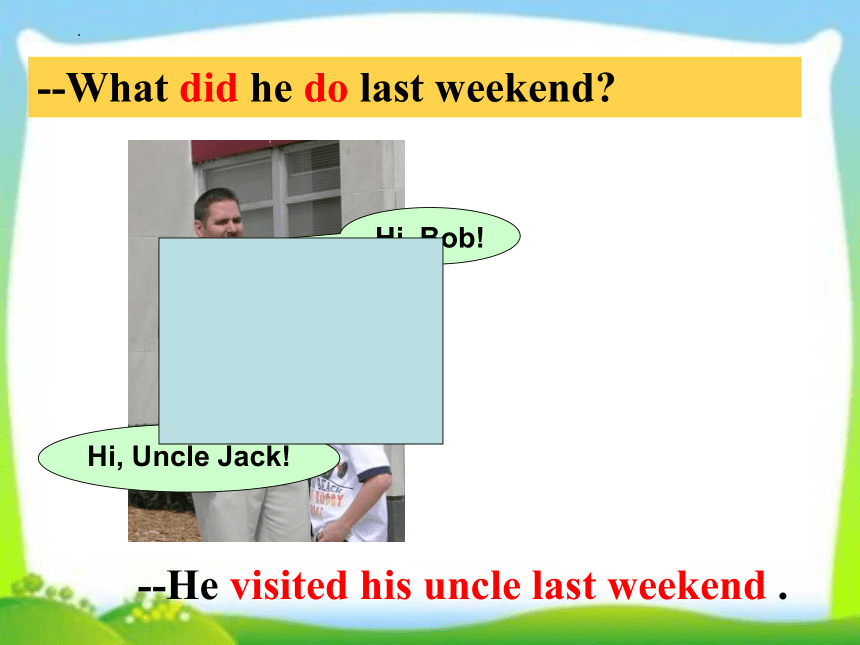
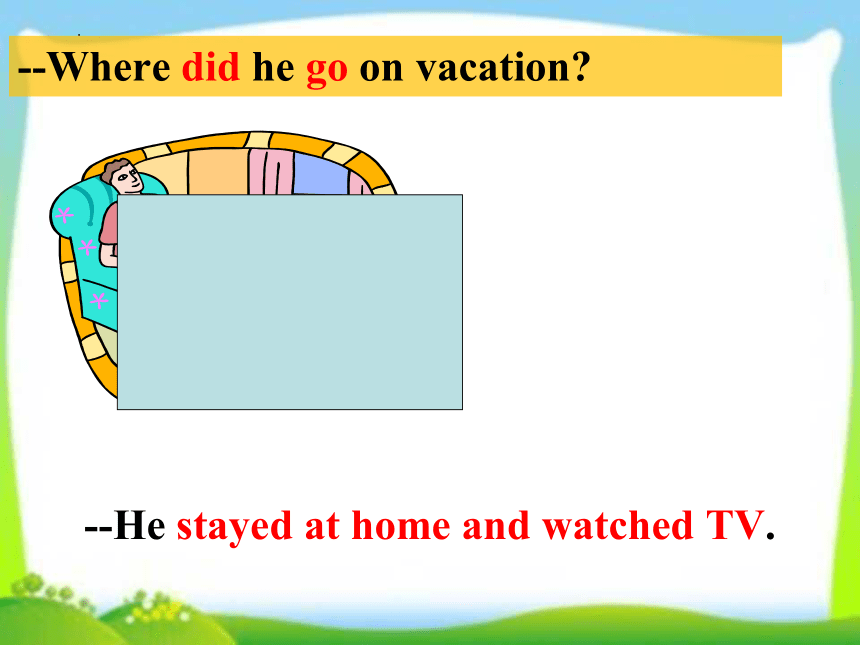
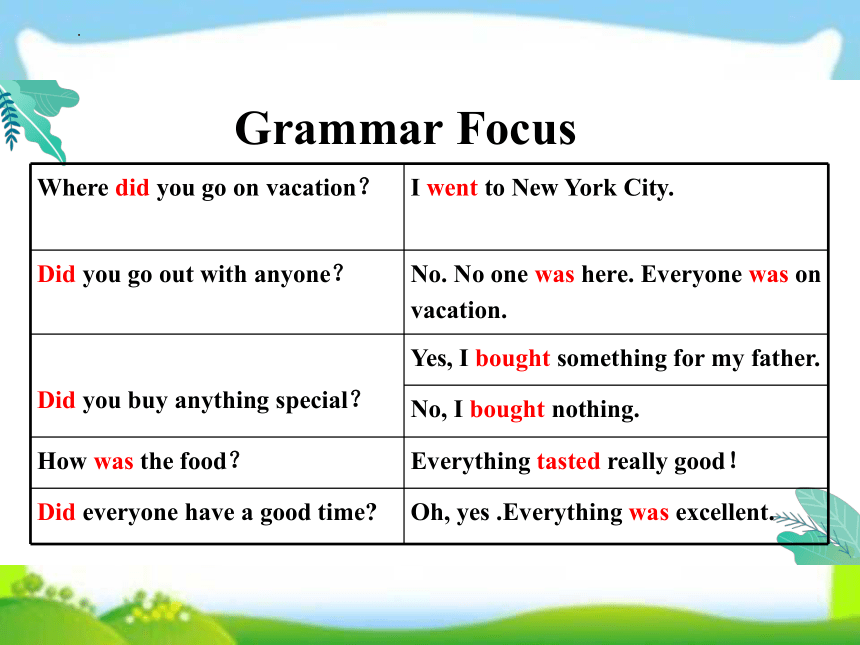
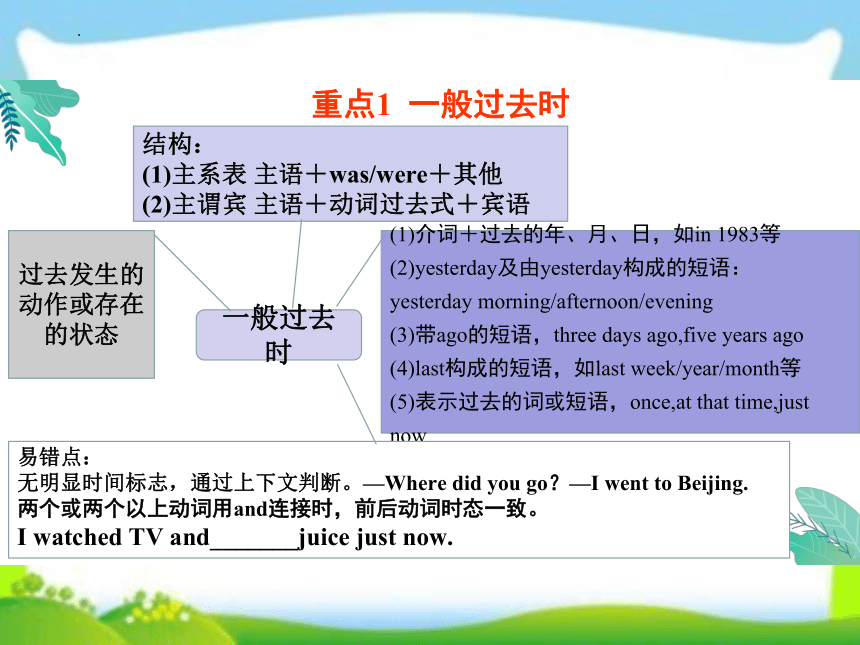
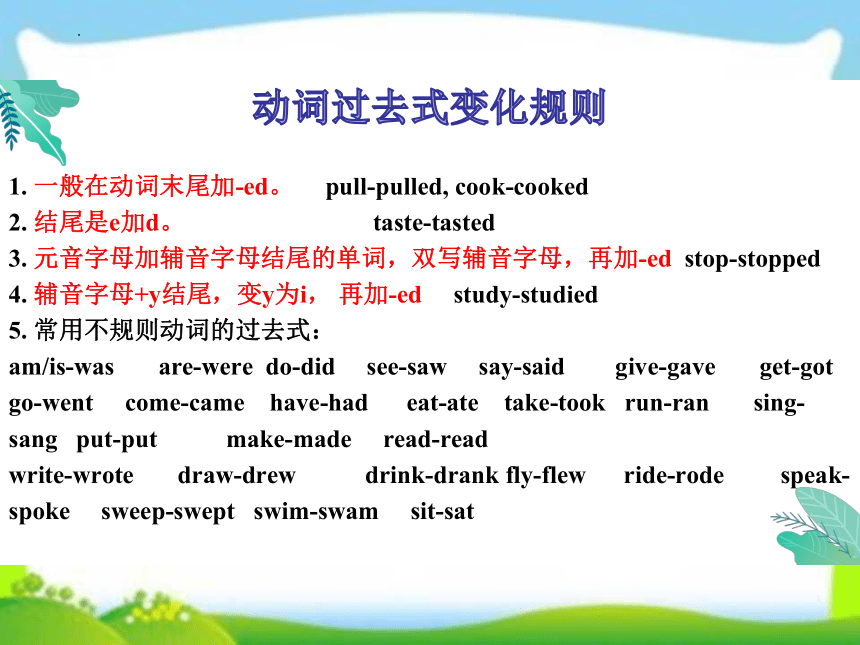
文档简介
(共22张PPT)
Where did you go on vacation
Unit 1
SectionA
3a-3c
ObjectivesObjectives
To learn some key words and useful expressions
To get information on how to learn English reading and listening
To learn different ways of learning English and practice using them in real situation
教学目标
Free talk
1.How was your summer vacation
2.Where did you go on vacation
3.What did you do during your summer vacation
Let's talk about your vacation.
Did they visit the zoo
No,they didn't.They visited museums.
Guessing game
Guess and answer
--What did he do last weekend
Hi, Bob!
Hi, Uncle Jack!
--He visited his uncle last weekend .
--Where did he go on vacation
--He stayed at home and watched TV.
Grammar Focus
Where did you go on vacation? I went to New York City.
Did you go out with anyone? No. No one was here. Everyone was on vacation.
Did you buy anything special? Yes, I bought something for my father.
No, I bought nothing.
How was the food? Everything tasted really good!
Did everyone have a good time Oh, yes .Everything was excellent.
重点1 一般过去时
一般过去时
过去发生的动作或存在的状态
结构:
(1)主系表 主语+was/were+其他
(2)主谓宾 主语+动词过去式+宾语
(1)介词+过去的年、月、日,如in 1983等
(2)yesterday及由yesterday构成的短语:
yesterday morning/afternoon/evening
(3)带ago的短语,three days ago,five years ago
(4)last构成的短语,如last week/year/month等
(5)表示过去的词或短语,once,at that time,just now
易错点:
无明显时间标志,通过上下文判断。—Where did you go?—I went to Beijing.
两个或两个以上动词用and连接时,前后动词时态一致。
I watched TV and_______juice just now.
1. 一般在动词末尾加-ed。 pull-pulled, cook-cooked
2. 结尾是e加d。 taste-tasted
3. 元音字母加辅音字母结尾的单词,双写辅音字母,再加-ed stop-stopped
4. 辅音字母+y结尾,变y为i, 再加-ed study-studied
5. 常用不规则动词的过去式:
am/is-was are-were do-did see-saw say-said give-gave get-got go-went come-came have-had eat-ate take-took run-ran sing-sang put-put make-made read-read
write-wrote draw-drew drink-drank fly-flew ride-rode speak-spoke sweep-swept swim-swam sit-sat
动词过去式变化规则
某人 某事
任何人 任何事
没有人 没有东西
每人 一切
someone
重点2 复合不定代词
anyone
no one
everyone
something
anything
nothing
everything
指物
指人
考点①不定代词做主语,谓语动词变三单
Something (be) wrong with my watch.
Everybody (be) in the classroom.
考点②形容词修饰不定代词,放在不定代词之后
Is there in today's newspaper?
A. anything interesting B. something interesting
C. interesting anything D. interesting something
考点③some用于肯定句及would you like some... 句型中
any用于否定句和疑问句
不指明代替哪个特定名词的代词叫做不定代词。
3a
Fill in the blanks with the words in the box and practice the conversation.
Linda: Did you do _________ fun on your
vacation, Alice
Alice: Yes, I did. I went to Sanya.
Linda: How did you like it
Alice: Well, it was my first time there, so
__________ was really interesting.
Linda: Did you go with ________
anyone something
anything everything nothing
anything
everything
anyone
Alice: Yes, I did. I went with my sister.
Linda: Did you go shopping
Alice: Of course! I bought _________
for my parents, but ______ for myself.
Linda: Why didn’t you buy ________ for
yourself
Alice: I didn’t really see _________ I like.
something
anything
nothing
anything
myself (我自己) ,yourself (你自己)是反身代词。表示“某人自己的词”叫反身代词。
3b
Fill in the blanks in the e-mail message with the
words in the box.
Dear Bill,
How was your vacation Did you do _________ interesting Did __________ in the family go with you I went to a friend’s farm in the countryside with my family.__________ was great. We fed some hens and saw some baby pigs. They were so cute! The only problem was that there was __________ much to do in the evening but read. Still ___________ seemed to be bored. Bye for now.
Mark
anything
everyone
Everything
nothing
No one
anything everything
nothing everyone no one
Did you… Everyone Someone (name) No one
eat anything at a restaurant
read anything interesting
visit anyone in your family
buy anything
keep a diary
3c
Ask your group questions about their last vacation. Then tell the class your results.
Give a report like this:
In our group, everyone ate something at a restaurant. No one read anything interesting. Li Lei visited his grandparents in the town. Liu Xue bought something interesting. Xu Li kept a diary.
Then give your own report about your group.
Summary
1.不定代词anyone, someone, everyone, no one, anything, something, everything 及 nothing 的用法。
2.How to use the past tense.
1. Lucy did her homework yesterday evening. (改为否定句)
Lucy ______ __ _____ _________ yesterday evening.
2. I had lunch at my friend’s home.
(改为一般疑问句,并作肯定回答)
—____ you ______ _____ at your friend’s home
—______, ___ _____.
3. Jim went to the beach last Sunday. (对画线部分提问)
_____ _____ Jim ______ last Sunday
4. They played basketball yesterday. (对画线部分提问)
________ _______ they play basketball
5. The students had great fun in the park. (改为同义句)
The students _____ ______ ____ _______ in the park.
didn’t do her homework
Did have lunch
Yes I did
What did do
根据要求改写下列句子。
When did
had a good / great time
用所给动词的适当形式填空。
We ______ (live) in Japan last year.
Jack________ (stop) the car last Sunday.
Tom _______ (clean) my room and ______(study)
for the Chinese test last weekend.
4.What ______ you ______(do) last night
5.On Sunday morning I _____ (play) tennis.
lived
stopped
cleaned
studied
did
do
played
句型转换
1. He found some meat in the fridge(冰箱).
(变一般疑问句)
2. She stayed there for a week.(对划线部分提问)
3. There was some orange in the cup.(变一般疑问句)
Did he find any meat in the fridge
How long does she stayed there
Was there any orange in the cup
1. I got up at nine yesterday morning.
______ ___ you get up yesterday morning
2. We did our homework last night.
_____ ____ you ___ last night
What did do
When did
对下列句子中的划线部分提问。
Exercises
3. They were in the supermarket last Sunday.
_______ _____ they last Sunday
My last weekend was great.
_____ _____ your last weekend
Linda took a walk with her parents after dinner.
_____ ____ Linda take a walk with after dinner
How was
Where were
Who did
1.背诵Grammar focus 部分。
2.复习复合不定代词的用法。
Where did you go on vacation
Unit 1
SectionA
3a-3c
ObjectivesObjectives
To learn some key words and useful expressions
To get information on how to learn English reading and listening
To learn different ways of learning English and practice using them in real situation
教学目标
Free talk
1.How was your summer vacation
2.Where did you go on vacation
3.What did you do during your summer vacation
Let's talk about your vacation.
Did they visit the zoo
No,they didn't.They visited museums.
Guessing game
Guess and answer
--What did he do last weekend
Hi, Bob!
Hi, Uncle Jack!
--He visited his uncle last weekend .
--Where did he go on vacation
--He stayed at home and watched TV.
Grammar Focus
Where did you go on vacation? I went to New York City.
Did you go out with anyone? No. No one was here. Everyone was on vacation.
Did you buy anything special? Yes, I bought something for my father.
No, I bought nothing.
How was the food? Everything tasted really good!
Did everyone have a good time Oh, yes .Everything was excellent.
重点1 一般过去时
一般过去时
过去发生的动作或存在的状态
结构:
(1)主系表 主语+was/were+其他
(2)主谓宾 主语+动词过去式+宾语
(1)介词+过去的年、月、日,如in 1983等
(2)yesterday及由yesterday构成的短语:
yesterday morning/afternoon/evening
(3)带ago的短语,three days ago,five years ago
(4)last构成的短语,如last week/year/month等
(5)表示过去的词或短语,once,at that time,just now
易错点:
无明显时间标志,通过上下文判断。—Where did you go?—I went to Beijing.
两个或两个以上动词用and连接时,前后动词时态一致。
I watched TV and_______juice just now.
1. 一般在动词末尾加-ed。 pull-pulled, cook-cooked
2. 结尾是e加d。 taste-tasted
3. 元音字母加辅音字母结尾的单词,双写辅音字母,再加-ed stop-stopped
4. 辅音字母+y结尾,变y为i, 再加-ed study-studied
5. 常用不规则动词的过去式:
am/is-was are-were do-did see-saw say-said give-gave get-got go-went come-came have-had eat-ate take-took run-ran sing-sang put-put make-made read-read
write-wrote draw-drew drink-drank fly-flew ride-rode speak-spoke sweep-swept swim-swam sit-sat
动词过去式变化规则
某人 某事
任何人 任何事
没有人 没有东西
每人 一切
someone
重点2 复合不定代词
anyone
no one
everyone
something
anything
nothing
everything
指物
指人
考点①不定代词做主语,谓语动词变三单
Something (be) wrong with my watch.
Everybody (be) in the classroom.
考点②形容词修饰不定代词,放在不定代词之后
Is there in today's newspaper?
A. anything interesting B. something interesting
C. interesting anything D. interesting something
考点③some用于肯定句及would you like some... 句型中
any用于否定句和疑问句
不指明代替哪个特定名词的代词叫做不定代词。
3a
Fill in the blanks with the words in the box and practice the conversation.
Linda: Did you do _________ fun on your
vacation, Alice
Alice: Yes, I did. I went to Sanya.
Linda: How did you like it
Alice: Well, it was my first time there, so
__________ was really interesting.
Linda: Did you go with ________
anyone something
anything everything nothing
anything
everything
anyone
Alice: Yes, I did. I went with my sister.
Linda: Did you go shopping
Alice: Of course! I bought _________
for my parents, but ______ for myself.
Linda: Why didn’t you buy ________ for
yourself
Alice: I didn’t really see _________ I like.
something
anything
nothing
anything
myself (我自己) ,yourself (你自己)是反身代词。表示“某人自己的词”叫反身代词。
3b
Fill in the blanks in the e-mail message with the
words in the box.
Dear Bill,
How was your vacation Did you do _________ interesting Did __________ in the family go with you I went to a friend’s farm in the countryside with my family.__________ was great. We fed some hens and saw some baby pigs. They were so cute! The only problem was that there was __________ much to do in the evening but read. Still ___________ seemed to be bored. Bye for now.
Mark
anything
everyone
Everything
nothing
No one
anything everything
nothing everyone no one
Did you… Everyone Someone (name) No one
eat anything at a restaurant
read anything interesting
visit anyone in your family
buy anything
keep a diary
3c
Ask your group questions about their last vacation. Then tell the class your results.
Give a report like this:
In our group, everyone ate something at a restaurant. No one read anything interesting. Li Lei visited his grandparents in the town. Liu Xue bought something interesting. Xu Li kept a diary.
Then give your own report about your group.
Summary
1.不定代词anyone, someone, everyone, no one, anything, something, everything 及 nothing 的用法。
2.How to use the past tense.
1. Lucy did her homework yesterday evening. (改为否定句)
Lucy ______ __ _____ _________ yesterday evening.
2. I had lunch at my friend’s home.
(改为一般疑问句,并作肯定回答)
—____ you ______ _____ at your friend’s home
—______, ___ _____.
3. Jim went to the beach last Sunday. (对画线部分提问)
_____ _____ Jim ______ last Sunday
4. They played basketball yesterday. (对画线部分提问)
________ _______ they play basketball
5. The students had great fun in the park. (改为同义句)
The students _____ ______ ____ _______ in the park.
didn’t do her homework
Did have lunch
Yes I did
What did do
根据要求改写下列句子。
When did
had a good / great time
用所给动词的适当形式填空。
We ______ (live) in Japan last year.
Jack________ (stop) the car last Sunday.
Tom _______ (clean) my room and ______(study)
for the Chinese test last weekend.
4.What ______ you ______(do) last night
5.On Sunday morning I _____ (play) tennis.
lived
stopped
cleaned
studied
did
do
played
句型转换
1. He found some meat in the fridge(冰箱).
(变一般疑问句)
2. She stayed there for a week.(对划线部分提问)
3. There was some orange in the cup.(变一般疑问句)
Did he find any meat in the fridge
How long does she stayed there
Was there any orange in the cup
1. I got up at nine yesterday morning.
______ ___ you get up yesterday morning
2. We did our homework last night.
_____ ____ you ___ last night
What did do
When did
对下列句子中的划线部分提问。
Exercises
3. They were in the supermarket last Sunday.
_______ _____ they last Sunday
My last weekend was great.
_____ _____ your last weekend
Linda took a walk with her parents after dinner.
_____ ____ Linda take a walk with after dinner
How was
Where were
Who did
1.背诵Grammar focus 部分。
2.复习复合不定代词的用法。
同课章节目录
- Unit 1 Where did you go on vacation?
- Section A
- Section B
- Unit 2 How often do you exercise?
- Section A
- Section B
- Unit 3 I'm more outgoing than my sister.
- Section A
- Section B
- Unit 4 What's the best movie theater?
- Section A
- Section B
- Unit 5 Do you want to watch a game show?
- Section A
- Section B
- Unit 6 I'm going to study computer science.
- Section A
- Section B
- Unit 7 Will people have robots?
- Section A
- Section B
- Unit 8 How do you make a banana milk shake?
- Section A
- Section B
- Unit 9 Can you come to my party?
- Section A
- Section B
- Unit 10 If you go to the party, you'll have a grea
- Section A
- Section B
